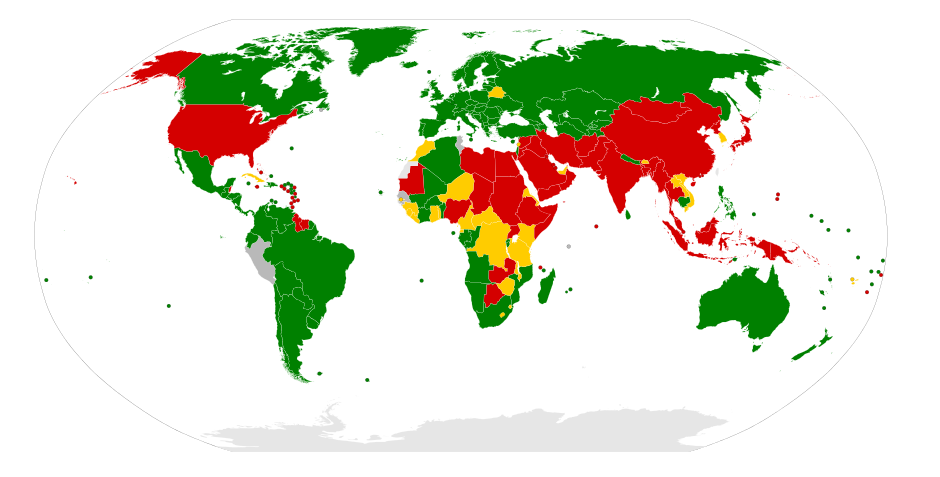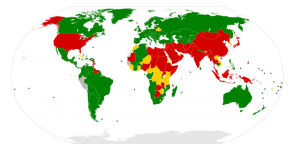United Nations Moratorium on The Death Penalty


The 2008 UN Vote on the Death Penalty. Red countries voted against, green for, yellow abstained. Source: Wikimedia Commons.
By Katherine Bacon
In 2007 the United Nations called for a moratorium on the practice of capital punishment globally. Since then, the United nations has adopted five more resolutions attempting to suspend the death penalty. The most recent resolution was held in December of 2016 at the 71st Assembly. Most United Nations countries have voted to adopt the resolution with around 100 votes per election. However a consistent 40 have voted against and around 30 have abstained. Among the countries that oppose abolition is the United States.
This resolution merely calls for suspending the death penalty, not total abolition, throughout the world. As a result, it hopes to extend human rights to death row prisoners across the globe. A resolution by the General Assembly however, is not binding and its adoption would not result in any legal repercussions for an offending state. Practicing the death penalty following the General Assembly resolution would be more “frowned upon” than an international crisis. It would also appear highly hypocritical.
The language within the resolution is pleading, using the words “welcoming” as the ask for abolition. While the requesting language is soft, the stance against the morality of the death penalty is not. Phrases such as “Considering that the use of the death penalty undermines human dignity,” or “ “Convinced that a moratorium on the use of the death penalty contributes to respect for human dignity and to the enhancement and progressive development of human rights, and considering that there is no conclusive evidence of the deterrent value of the death penalty,” leave no room for further questioning on the matter. The resolutions also call upon former human rights efforts and doctrine to support their position.
The document even praises the small efforts taken by certain countries to reduce their execution numbers, and consider this a victory no matter how small. Their clear goal is to extend human rights and the persistent effort is admirable. However, a great obstacle in the path to global recognition of the death penalty as a violation of basic human rights is the United States and its persistence upon continuing the practice.
The United States was an early adopter of a death penalty moratorium. However, after about a decade long suspension of executions in the country, it now persists as one of the largest countries still using capital punishment. It is the only one of the major powers from forming the United Nations to still do so and the only “westernized” country. In each General Assembly the United States has voted against a global moratorium. As a requirement of being part of the European Union, states are forbidden from imposing capital punishment upon its prisoners. How has this affected the global campaign for abolition? If “the land of the free” sees it as humane and useful, why should the other countries feel the need to follow suit with the rest of the modern world?
Somewhat surprisingly due to the country’s turbulent political history in recent decades, Italy has been the spark for United Nations moratorium campaigns. The campaign by the United Nation to do away with executions by government hand began with Italy as early as 1993 with the first resolution attempt in 1994. The campaign has continued in earnest since as human rights advocates make steps toward abolishing the practice. The United Nations Commission of Human Rights has been approving resolutions to abolish the death penalty every year with some progress, however not the complete victory which is their goal.
Perhaps it can be explained by the electoral voting system of the United States or the fear of backlash and public outcry on the scale which erupted the last time the death penalty was abolished in the United States. However, this may be an issue which surpasses the decision level of the average citizen and voter. The United States should join the rest of the world in taking steps toward acknowledging human dignity and freedom for all. The country currently poses as a beacon for its continuation, regardless of how great or how little the number of executed are. On principle, the United States should adopt or even make steps toward establishing a moratorium on the death penalty. It is a sad state of affairs when a doctoral nation such as China, with the highest number of executions globally, has announced it is taking steps toward establishing a moratorium, while the self proclaimed leader of the free world sits silent in the corner.